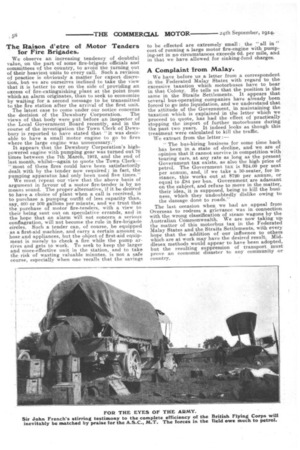The Raison d'etre of Motor Tenders for Fire Brigades.
Page 2

If you've noticed an error in this article please click here to report it so we can fix it.
We observe an increasing tendency of doubtful value, on the part of some fire-brigade officials and committees of the country, to avoid the turning out of their heaviest units to every call. Such a revision of practice is obviously a matter for expert discretion, but we are ourselves inclined to take the view that it is better to err on the side of providing an excess of fire-extinguishing plant at the point from which an alarm originates, than to seek to economize by waiting for a second message to be transmitted to the fire station after the arrival of the first unit. The latest case to come under our notice concerns the decision of the Dewsbury Corporation. The views of that body were put before an inspector of the Local Government Board recently, and in the course of the investigation the Town Clerk of Dewsbury is reported to have stated that it was desirable to have a small motor engine to go to fires where the large engine was unnecessary."
It appears that the Dewsbury Corporation's highpowered engine with pumping gear was turned out 76 times between the 7th March, 1912, and the end of last month, whilst—again to quote the Town Clerk— 'most of -these fires could have been satisfactorily dealt with by the tender now required ; in fact, the pumping apparatus had only been used five times." We must repeat our view that the above basis of argument in favour of a motor fire-tender is by no means sound. The proper alternative, if it be desired to have a choice of plant when a call is received, is to purchase a pumping outfit of less capacity than, say, 400 or 500 gallons per minute, and -we trust that the purchase of motor fire-tenders, with a view to their being sent out on speculative errands, and in the hope that an alarm will not concern a serious conflagration, will not become the rule in fire-brigade circles. Such a tender can, of course, be equipped as a first-aid machine, and carry a certain amount o. hose and appliances, but the object of first-aid equipment is merely to check a fire while the pump arrives and gets to work. To seek to keep the larger and more-effective unit in the station, and to take the risk of wasting valuable minutes. is not a safe course, especially when one recalls that the savings to be effected are extremely small : the "all in" cost of running a large motor fire-engine with pumping-set in no circumstances exceeds 6d. per mile, and in that we have allowed for sinking-fund charges.




















